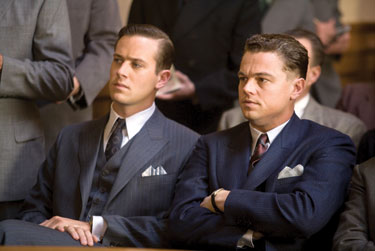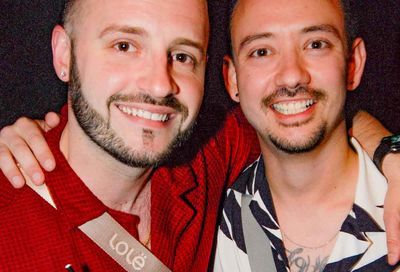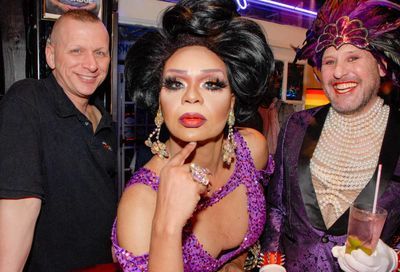Insecurity
Clint Eastwood and Dustin Lance Black's 'J. Edgar' is a mess of a biopic with plenty to say, but no idea how to say it well
Clint Eastwood deserves a whole lot of credit. As a director, he’s pushed away the man’s man archetype that made him famous — you know, the one that entrenched a whole bucket of misconceptions about masculinity into American culture. Lately, his subjects are tortured and flawed. When they grimace, it’s out of anguish, not for want of blowing away a baddie with a six-shooter. They’re callous because of their insecurities, distant because it’s safe. So, in a sense, a biography of former FBI Director J. Edgar Hoover — with Leonardo DiCaprio in tow to play lead — should be the perfect vehicle for Eastwood to keep on hacking away at that tough guy image. Except, it’s a rotten movie.
Draped in dull tones and irregular makeup, J. Edgar duds particularly because of Eastwood’s filmmaking style. (See: Invictus.) He’s respectfully distant, carrying the trademark restraint that worked in Mystic River and Gran Torino, but can’t manage to make his subject compelling this time around — which is kind of amazing considering that, in this case, the subject is a paranoid cross-dresser who spied on and blackmailed the most powerful politicians in the country for almost half a century.

J. Edgar: Hammer and DiCaprio
(Photo by Keith Bernstein)
J. Edgar opens in 1919 as anarchists bomb the Washington home of Hoover’s once boss, Attorney General Alexander Palmer. Although Palmer survives, Hoover, then a Justice Department agent tasked with tracking “subversives,” is shaken by the attack; it’s the seed that sprouts his lifelong obsession with security and control. Then, the movie cuts to a noticeably paunchier Hoover, who’s dictating the experience to a young FBI agent writing his memoirs. From there, the plot hops back and forth, skipping between the decades as Hoover curries favor, consolidates power, and shapes the FBI. It’s a confusing and largely irritating method that’s never justified in a satisfying way, and only serves to suggest the end is near when it’s not. (A soft fade to black not immediately followed by credits should be punishable by some harsh, public humiliation. Aside from, you know, the act itself.)
Between DiCaprio’s yammering voiceover, which lingers along in a strained accent from era to era, and a deluge of ham-fisted dialogue, there’s an unresolved dissonance between J. Edgar‘s exposition and direction. Eastwood, a guy who’s as hands-off as Hollywood directors get, breaks the first rule of storytelling — he tells first, shows later. The problem magnifies itself later, when he reveals that Hoover is an unreliable narrator; the move feels like a cheap trick passed off as narrative genius.
Still, there might be a good movie buried somewhere in J. Edgar. (Maybe.) While Dustin Lance Black’s script isn’t as graceful or provocative as what he brought to Milk, or even the lesser episodes of HBO’s Big Love, it weaves an interesting relationship between Hoover and Clyde Tolson (Armie Hammer), the FBI’s second-in-command. Tolson’s smitten with Hoover, and the two men seemingly do everything together; in work, at dinner, or on vacations, they’re always side-by-side. It may have been their dull surroundings, but DiCaprio and Hammer are absolutely eye-catching together. DiCaprio does his usual brow-furrowing-mental-anguish to great effect, while Hammer seems to be the only person on set who’s actually having fun. (Although, as an aged Tolson, he looks more a burn victim than an old guy.) Their relationship is an impressive depiction of what could have happened behind closed doors, where Hoover’s fear and embarrassment about sexuality were in full view.

Starring Leonardo DiCaprio, Armie Hammer, Naomi Watts
Rated R
137 Minutes
Area Theaters
The rest of Black’s work slashes through any of that goodwill. He writes Hoover’s mother as a dreadfully stiff upper lip plucked from a Tennessee Williams fever dream, misusing an overlooked and out of place Judi Dench. At times, J. Edgar even seems like an older, backward Forrest Gump of sorts. As he stiffens into old age, Hoover is thrown into scenes with Charles Lindbergh (Josh Lucas), Robert Kennedy (Jeffrey Donovan), Lela Rogers (Lea Thompson), and Richard Nixon (Christopher Shyer). While historically accurate, most of these encounters — especially Donovan’s RFK, who sounds like a Nantucket Barbara Walters — end up as distracting or just plain odd.
In the end, it’s all just too much to handle. Even before the scene where Hoover dons a dress with enough overwrought gravitas to tilt the Moon’s orbit, there’s simply no compassion left for the man, his struggle, or the world that shaped him. J. Edgar is a mess of a biopic with plenty to say, but no idea how to say it well.
Support Metro Weekly’s Journalism
These are challenging times for news organizations. And yet it’s crucial we stay active and provide vital resources and information to both our local readers and the world. So won’t you please take a moment and consider supporting Metro Weekly with a membership? For as little as $5 a month, you can help ensure Metro Weekly magazine and MetroWeekly.com remain free, viable resources as we provide the best, most diverse, culturally-resonant LGBTQ coverage in both the D.C. region and around the world. Memberships come with exclusive perks and discounts, your own personal digital delivery of each week’s magazine (and an archive), access to our Member's Lounge when it launches this fall, and exclusive members-only items like Metro Weekly Membership Mugs and Tote Bags! Check out all our membership levels here and please join us today!






















